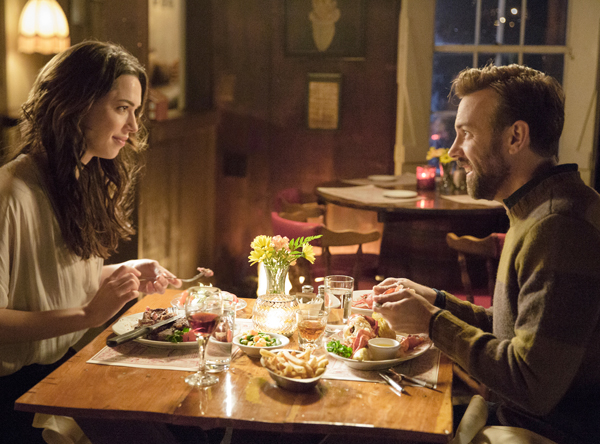As in the recent documentary Amy, questions of who has the right to tell a deceased musicians story come into stark question. (Fans? The family?) Tumbledown, from first-time feature director Sean Mewshaw, brings up a lot of arresting issues. A talented musician dies after releasing only one brilliant album, and as his widow struggles to hold on to her version of his memory, a college professor tries to the bottom of the famous musician, who he views as a tortured soul.
Rebecca Hall plays Hannah, the widow of legendary folk singer Hunter Miles. He passed away a few years back in a hiking accident, and Hannah is still dealing with the aftermath. Living in their mountain home in Maine, shes struggling to write his definitive biography. She also keeps inventory of his gravesite, where fans leave tokens of their love for him. One such fan, Andrew (Jason Sudeikis), a pop culture professor at Hofstra University, wants to write about Hunter as well. Hannah is at first horrified at the idea of anyone but her telling Hunters story. After the local bookstore owner and newspaper editor (Griffin Dunne) suggests that her writing could use some work, she reluctantly agrees to collaborate with Andrew.
Andrew travels up from New York to stay with Hannah, and a romance begins. He gets to know the locals that make up the tiny town, including electrician Curtis (Joe Manganiello), who Hannah has been casually sleeping with. She also brings Andrew along to an Easter dinner to meet her family, including her parents (Blythe Danner and Richard Masur). The budding romance is also complicated by the fact that Andrew has a girlfriend (Dianna Agron) back home. Hannah and Andrew grow closer, but the discovery of unreleased music by Hunter puts their relationship at risk: Hannah wants to protect his memory, and Andrew wishes to share this find with the world.
Theres goofiness to the film that feels out of place. At one point, Andrew is alone at Hannahs and amusingly riffles through her home for secrets about Hunter. It seems a cruel act for someone who respects the musician. Such decisions throughout dont always make sense, such as when Andrew, drawing on his academic knowledge of tortured musicians, comments to Hannahs father that Hunter must have committed suicide. Its insanely uncalled for and makes Andrew comically uncaring. Aside from their mutual attraction, its tough to see why Hannah lets Andrew into her life so willingly.
Hall plays Hannah as truly content in her life, but her main character trait is her inability to let go of Hunters memory. Everyone keeps telling her to move on, but she appears as though she has been doing fairly well, considering the tragic circumstances. The supporting characters, however, are wonderfully acted and become the voice of the audience. Danner and Masur demonstrate quirkiness while simultaneously being fiercely protective of Hunter and Hannah; both express to Andrew that they wont put up with his morbid fascination with Hunter. (I found myself wishing they, as well as Dunne, had more screen time.)
For a film all about the power of music, it feels like the music is missing. Hunters songs play over some scenes, but the film never gets to the heart of why this musician was so influential. The soundtrack also doesnt quite fit; it mimics the emotional beats so conventionally it becomes mundane. The film, however, looks incredible. Mewshaw covers the screen in cozy plaids and sets it in log cabins against the beautiful landscape (British Columbia substituting for Maine). Theres no question why Hunter and Hannah would make their home in this inspirational location.
Tumbledown is the kind of film that isnt quite sure of its theme. It has a few to choose from: loss and letting go, the power of music, fan culture. It flip-flops between romcom and full drama; the climactic ending scene certainly suggests the former. Indecisiveness, however, doesnt completely cover up the compelling story underneath.







Leave A Comment